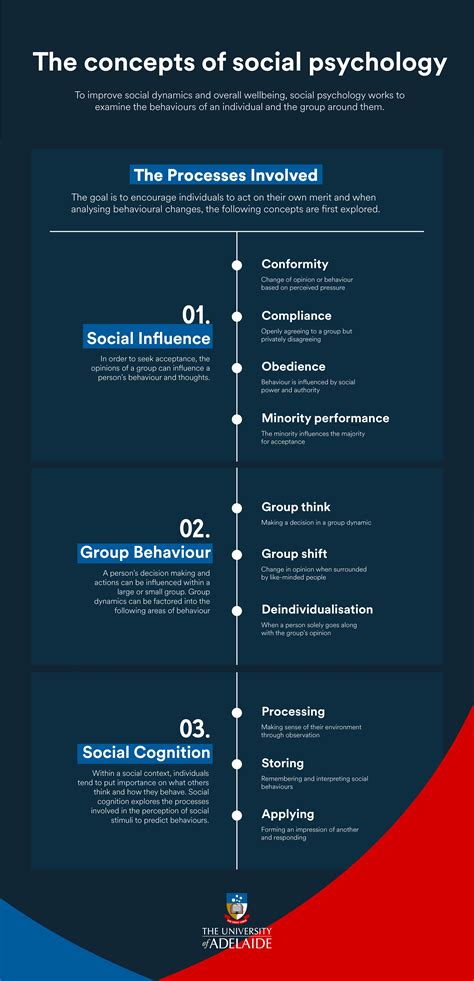The study of psychology is a vast and intricate field that seeks to understand the complexities of the human mind and behavior. With so many concepts and theories out there, it can be overwhelming to navigate the world of psychology. However, there are certain fundamental concepts that are essential to understanding human behavior, emotions, and interactions. In this article, we will explore five essential psychology concepts that you need to know.
The Power of the Placebo Effect

The placebo effect is a phenomenon in which a person experiences a real change in their physical or emotional state after receiving a dummy treatment or intervention. This can be a pill, injection, or even a ritual. The key is that the person believes that the treatment will have a positive effect, and this belief triggers a response in the brain that actually produces the desired outcome.
The placebo effect is a powerful tool in psychology, as it highlights the complex interplay between the mind and body. By harnessing the power of the placebo effect, psychologists and medical professionals can create effective treatments that are tailored to an individual's unique needs and experiences.
How the Placebo Effect Works
The placebo effect works by triggering the release of neurotransmitters in the brain, such as dopamine and endorphins. These chemicals are associated with feelings of pleasure, relaxation, and reduced pain. When we believe that a treatment will work, our brain releases these chemicals, which in turn produces the desired effect.
For example, studies have shown that people who receive a placebo pill for pain relief experience a significant reduction in pain, even though the pill is inert. This is because the brain is tricked into believing that the pill is real, and it responds accordingly.
The Science of Emotional Intelligence

Emotional intelligence (EI) refers to the ability to recognize and understand emotions in oneself and others. This concept was first introduced by psychologist Peter Salovey and John D. Mayer in the 1990s and has since become a widely accepted and researched topic in psychology.
EI involves several key components, including:
- Self-awareness: the ability to recognize and understand one's own emotions
- Self-regulation: the ability to control and manage one's own emotions
- Motivation: the ability to use emotions to drive motivation and achieve goals
- Empathy: the ability to recognize and understand emotions in others
- Social skills: the ability to effectively communicate and interact with others
Why Emotional Intelligence Matters
Emotional intelligence is essential for building strong relationships, achieving success in work and personal life, and maintaining good mental and physical health. People with high EI are better equipped to manage stress, navigate complex social situations, and make informed decisions.
In addition, EI is linked to a range of positive outcomes, including improved academic performance, better job performance, and increased overall well-being.
The Psychology of Decision-Making

Decision-making is a complex and multifaceted process that involves both conscious and unconscious factors. Psychologists have identified several key biases and heuristics that influence decision-making, including:
- Confirmation bias: the tendency to seek out information that confirms our existing beliefs
- Anchoring bias: the tendency to rely too heavily on the first piece of information we receive
- Availability heuristic: the tendency to overestimate the importance of vivid or memorable information
- Hindsight bias: the tendency to believe, after an event has occurred, that we would have predicted it
Understanding Decision-Making Biases
Recognizing and understanding these biases is essential for making informed and effective decisions. By being aware of our own biases and heuristics, we can take steps to mitigate their influence and make more rational choices.
For example, by seeking out diverse perspectives and information, we can reduce the impact of confirmation bias and make more informed decisions.
The Power of Positive Thinking

Positive thinking is a powerful tool for improving mental and physical health, achieving success, and increasing overall well-being. By focusing on positive thoughts and emotions, we can:
- Reduce stress and anxiety
- Improve mood and overall sense of well-being
- Increase motivation and drive
- Enhance resilience and coping skills
How to Cultivate Positive Thinking
Cultivating positive thinking involves several key strategies, including:
- Practicing gratitude: focusing on the things we are thankful for
- Reframing negative thoughts: challenging negative thoughts and replacing them with more positive and realistic ones
- Engaging in positive self-talk: using positive and supportive language when talking to ourselves
- Surrounding ourselves with positive people: seeking out supportive and positive relationships
The Benefits of Mindfulness

Mindfulness is the practice of being fully present and engaged in the current moment, without judgment or distraction. This involves:
- Paying attention to our thoughts, feelings, and sensations
- Being aware of our surroundings and environment
- Letting go of worries about the past or future
Why Mindfulness Matters
Mindfulness has a range of benefits, including:
- Reduced stress and anxiety
- Improved mood and overall sense of well-being
- Increased focus and concentration
- Enhanced self-awareness and self-acceptance
By incorporating mindfulness into our daily lives, we can improve our mental and physical health, increase our productivity and effectiveness, and enhance our overall quality of life.






What is the difference between emotional intelligence and IQ?
+Emotional intelligence (EI) and intelligence quotient (IQ) are two distinct concepts. IQ measures cognitive abilities, such as reasoning and problem-solving, while EI measures the ability to recognize and understand emotions in oneself and others.
How can I improve my emotional intelligence?
+Improving emotional intelligence involves several strategies, including practicing self-awareness, developing empathy, and learning effective communication skills. Additionally, seeking feedback from others and engaging in mindfulness practices can also help.
What is the relationship between positive thinking and mental health?
+Positive thinking has been linked to a range of mental health benefits, including reduced stress and anxiety, improved mood, and increased resilience. By cultivating positive thoughts and emotions, individuals can improve their overall mental well-being.
